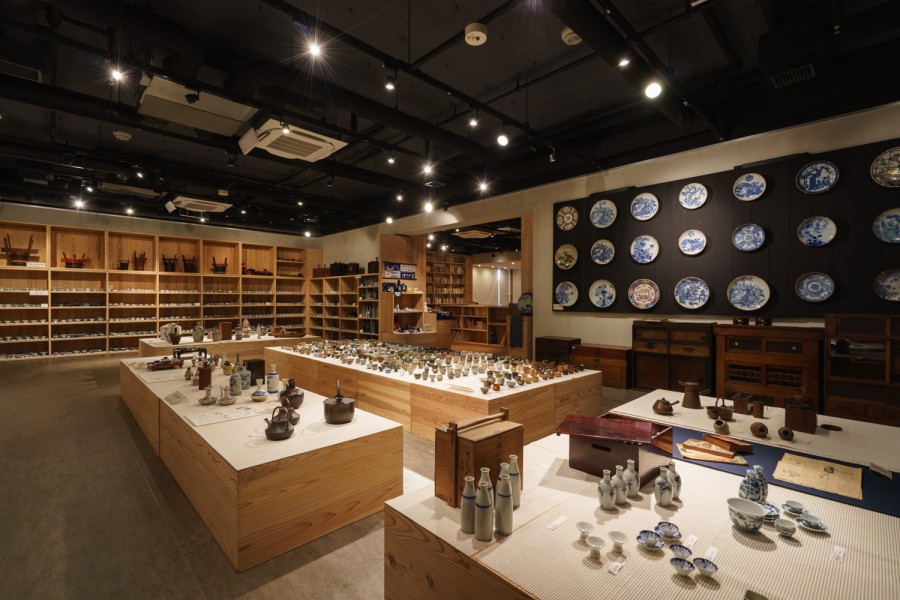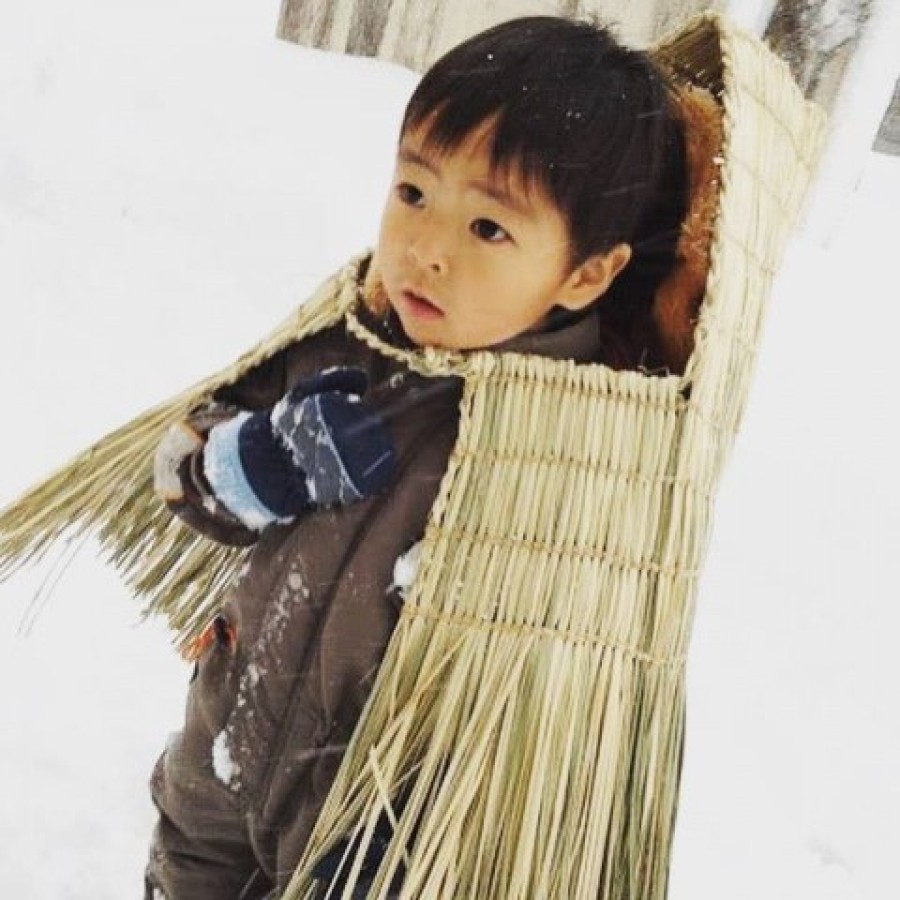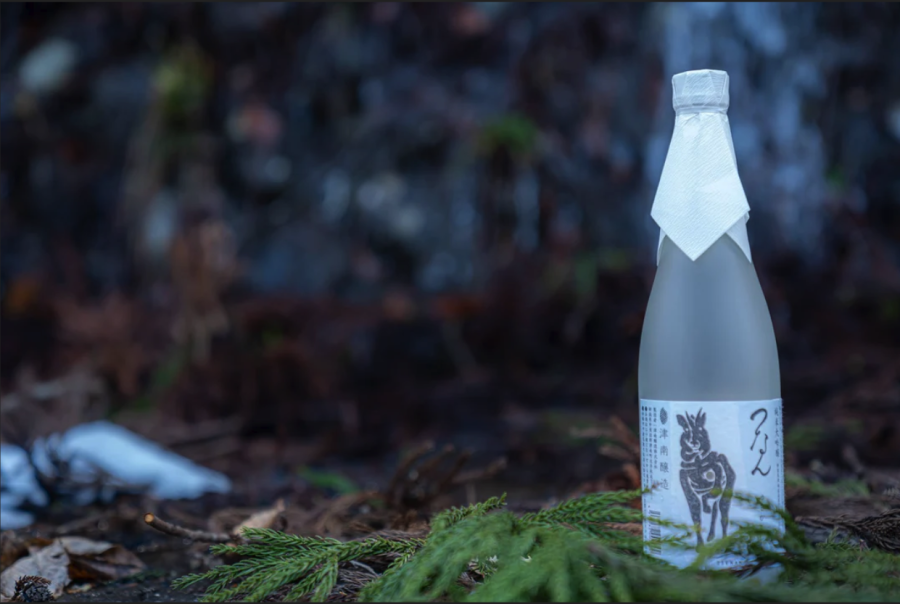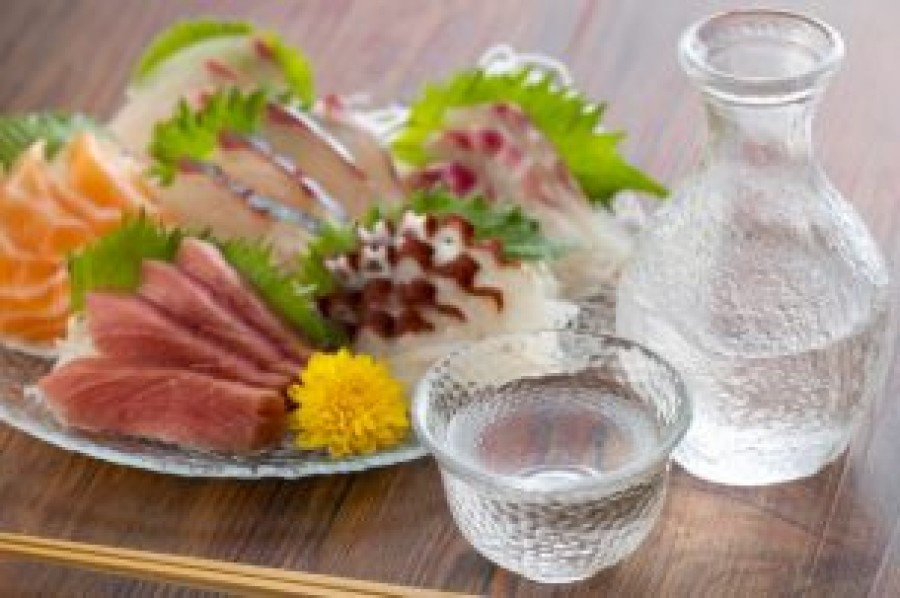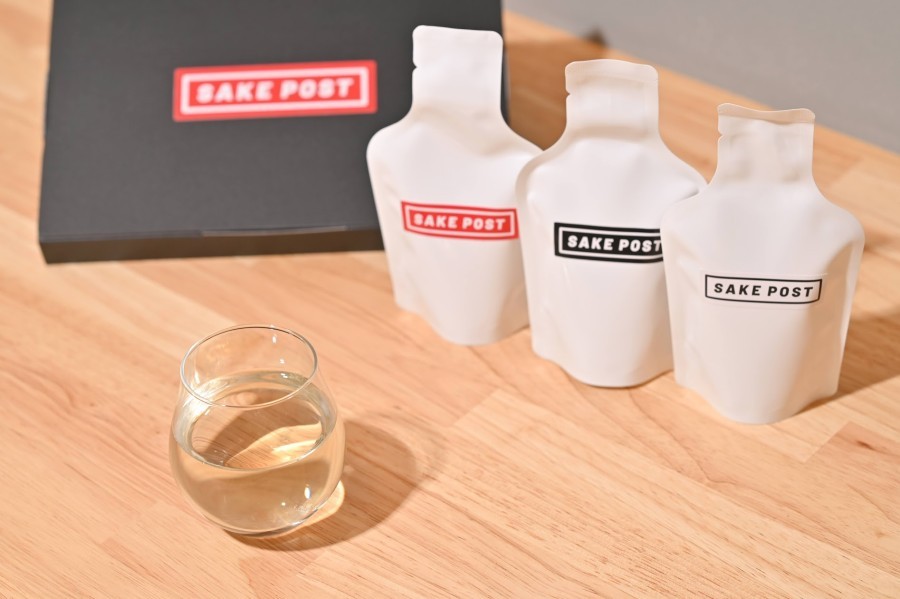A series of sake trips around Niigata Prefecture to enjoy and use as a reference for realistic sake trip plans.
This issue features sake breweries in the northern part of the prefecture, in the cities of Murakami and Shinbata.
There are two breweries in Murakami and four in Niihata.
Enjoy a sake trip while enjoying the history of the castle town and the Sea of Japan in early summer.
Sake, food and people in a castle town in the north of the prefecture.
Located on the border of Yamagata Prefecture, the city of Murakami is a castle town blessed with nature, nestled amongst the so-called 'Castle Mountains' where Murakami Castle was built, close to the Miomotegawa River where salmon run upstream and the Seba Coast where the Seba Hot Springs spring springs are located.
The Taiyo Shuzo brew ery, which produces 'Taiyo Zakari', and the Miyao Shuzo brewery, which produces 'Shizuhari Tsuru', are located here.
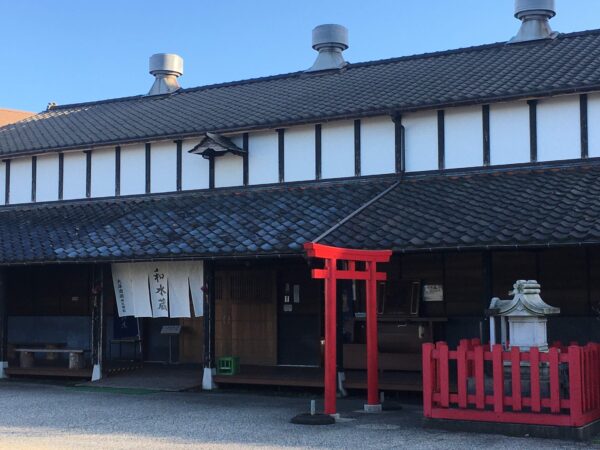
The Taiyo Brewery was created in 1920 (Showa 20) as a result of a post-war merger of 14 breweries. Some of the breweries before the merger were founded in the Edo period.
Currently, tours of the production plant (Horin warehouse) are not available, but tours of the Nagomigura warehouse, which has been developed as a tourist warehouse, can be enjoyed without a reservation. Tours of the old brewery are also possible with a reservation.
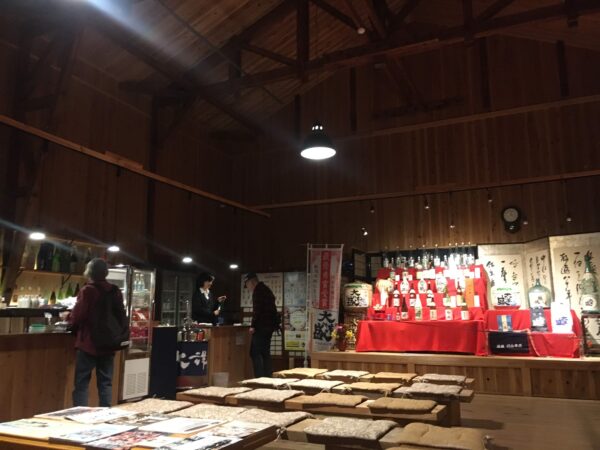
In the Wasui warehouse, valuable sake brewing tools and furnishings remaining from each of the brewery's houses before the merger are on display. It also participates in the 'Machiya no Ningyosama Tour' held in spring and the 'Castle Town Murakami Machiya no Byobu Festival' held in autumn.
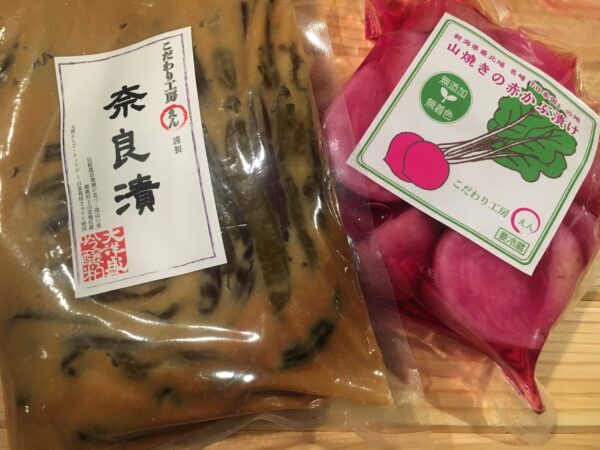
Various types of sake and liqueurs, pickles, sake lees and original goods are also sold at the Wasuikura. The 'kuradashi hara-sake', which can only be bought here, is recommended as a souvenir.
Check the website for opening hours of the Wasuigura.

The Taiyo Shuzo's early summer recommendation is Junmai Ginjo Taiyo Mori Sky Blue Label.
This cool-looking sake has a fruity aroma and a sweet-sour taste, made from rare local sake rice Takananishiki, which has been cut down to 55% and yeast that produces malic acid.
It has a low alcohol content of 13% and is therefore recommended for beginners.
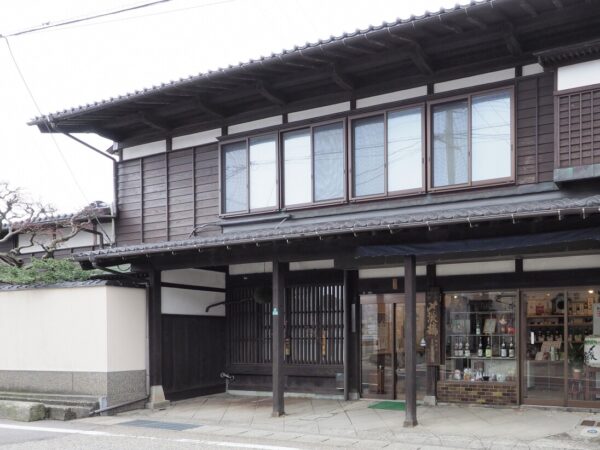
Another sake brewery, Miyao Shuzo, is located along the Monzen River, a tributary of the Miomotegawa River.
Visitors cannot observe the brewing process, but they can watch the brewing tanks lined up from the entrance to the brewery and listen to a talk about the Miyao Brewery's sake brewing process.
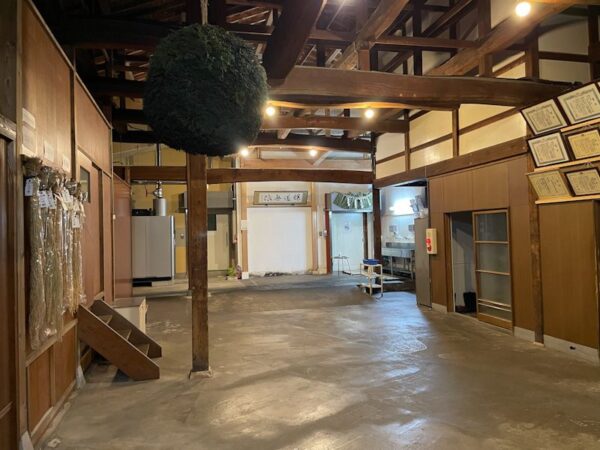
No advance booking required, closed on Sundays. Open on Saturdays and public holidays. Products are also available for sale, so you can stop by for a visit while touring the townhouses.
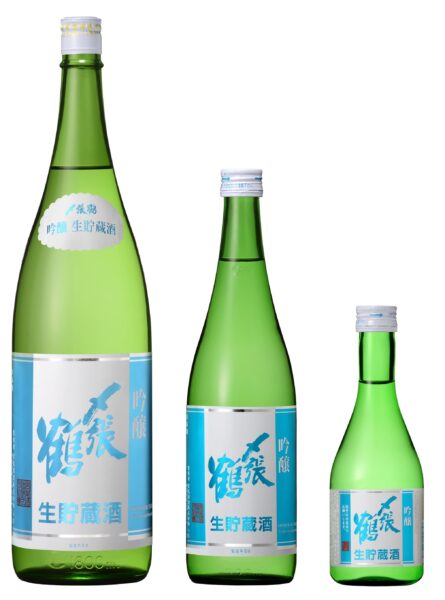
The most popular summer sake from Miyao Shuzo is SNAKEIHARIZURU GINJO NAMAKU SHOSHU. By storing it fresh at low temperatures, it retains its fresh taste and aroma, but has an umami flavour and a clean aftertaste. It is a summer-only sake that many fans look forward to every year, and is also available in a 300 ml size.
Salmon dishes are a must-taste when visiting Murakami!
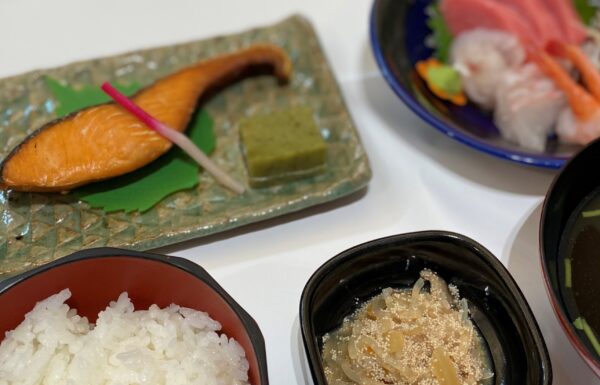
The photo shows the Uoya Shiobiki Gozen at Kaisen Ichibire, a restaurant under the direct management of Echigo-Murakami Uoya, a 200-year-old salted salmon processing company.
Kappo restaurants in the city and restaurants directly managed by salmon processing shops serve salted salmon and harako donburi all year round. From late November, when the salmon return to the Miomotegawa River, a variety of salmon dishes appear, and some kappo restaurants offer a course.
Many restaurants offer local sake, so train travellers and those who do not drive should also enjoy pairing local sake with salmon dishes.
The Murakami Tourist Association is holding the Murakami Donburi Battle until the end of September 2022, with around 30 restaurants across Murakami taking part. Check out the participating restaurants.
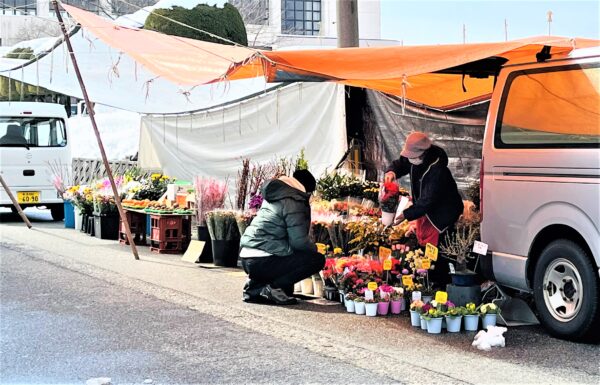 The historic morning market, Rokusai Market, is held every month on the days marked by 2 and 7.
The historic morning market, Rokusai Market, is held every month on the days marked by 2 and 7.
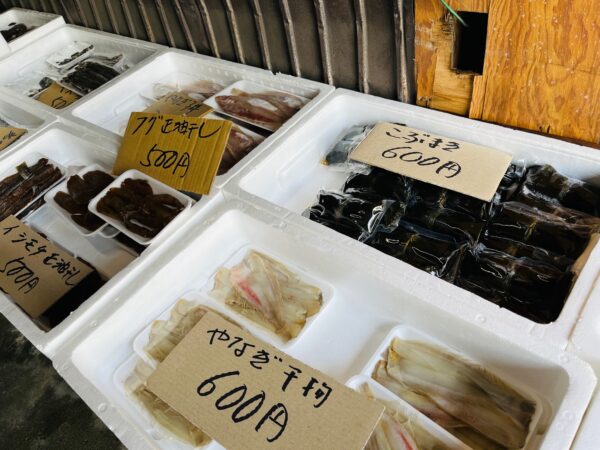
Products from the sea, mountains and fields, handmade processed goods and flowers are available at the regular markets. The chance to meet the locals while shopping is also one of the best parts of the trip.
Sake shops selling local sake from two breweries are dotted around Murakami city centre. Enjoy a sake chat with the owner and choose your favourite.
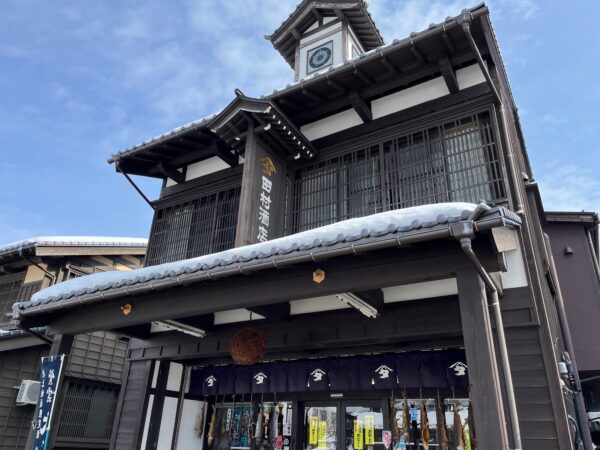
Tamura Sake Brewery, with its symbolic monomitori turret, is located along Echigo-Murakami Machiya-dori, a street lined with machiya-style buildings. Founded in 1914.
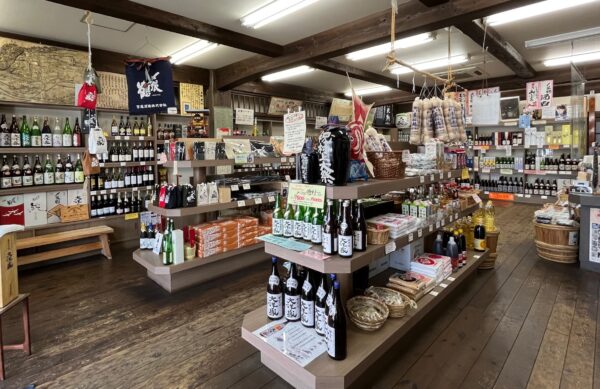 The shop is crammed with a wide range of sake, from the standard brands of Shimehari Tsuru and Taiyozakari to seasonal sake. Some sake is sold exclusively in the local area, so ask about it.
The shop is crammed with a wide range of sake, from the standard brands of Shimehari Tsuru and Taiyozakari to seasonal sake. Some sake is sold exclusively in the local area, so ask about it.
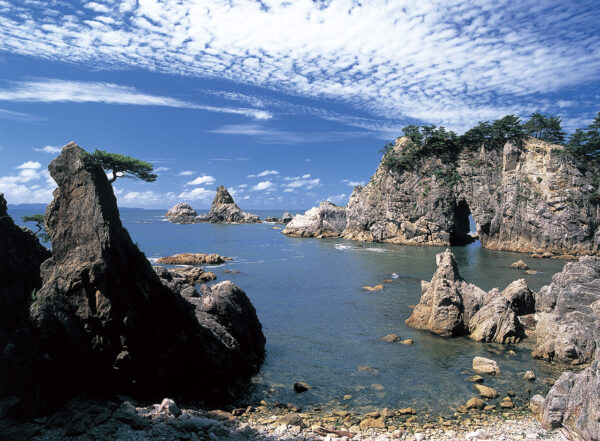 After enjoying the local sake spots in the castle town, you can extend your visit to the scenic Sasagawa-ryu stream. The clear blue sea and varied coastal scenery stretches for about 11 km. The island of Awashima in the Sea of Japan is also a sight to behold.
After enjoying the local sake spots in the castle town, you can extend your visit to the scenic Sasagawa-ryu stream. The clear blue sea and varied coastal scenery stretches for about 11 km. The island of Awashima in the Sea of Japan is also a sight to behold.
Four local breweries come to life in the castle town of Shimbanda.
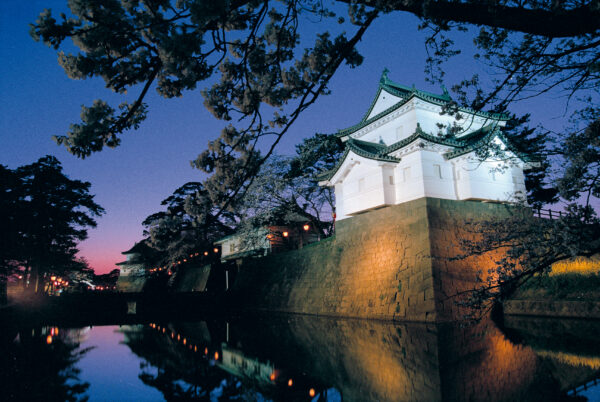
In the castle town of Shinbada, whose symbol is the Shinbada Castle, known for its cherry blossoms, there are four sake breweries: the Omon Brewery ( renamed from the Ichijima Brewery in February 2022), the Kinmasu Brewery, theKikusui Brewery and theFujinoi Brewery. All are represented by the name of the brewery.
The Omon Brewery and Kinmasu Brewery are located within walking distance of Shinboda Station.
The Wangmon Sake Brewery is a 5-minute walk from Shinboda Station.
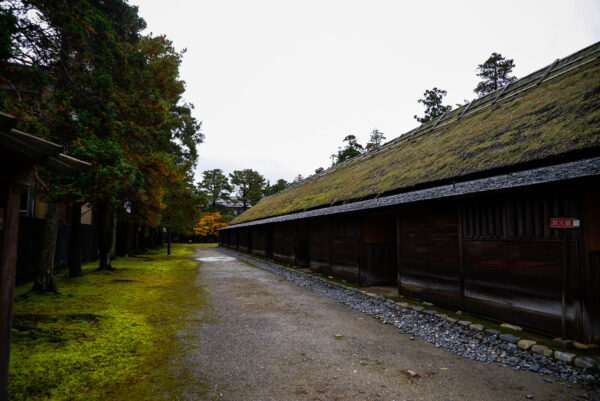 Nearby are Shimizuen Garden and Ashigaru Nagaya, which were built as the residence of the Mizoguchi family, lords of Shinbada Castle. The photograph shows the Ashigaru Nagaya.
Nearby are Shimizuen Garden and Ashigaru Nagaya, which were built as the residence of the Mizoguchi family, lords of Shinbada Castle. The photograph shows the Ashigaru Nagaya.

Representative brand name 'Omon Junmai Umakuchi Emblem'.
Oomon Shuzo was founded in the Kansei era (1790s), and in addition to its flagship brand Oomon, the company also offers Hidematsu and Yume, named after the founder, and the sweet, low-alcohol Kalen series, aimed at young people.

'Omon Daiginjyo extremely spicy 19'. Daiginjo-genshu that can be enjoyed on the rocks or with soda - a new possibility for sake.
On 29 April 2022, the experiential sake brewery resort Gokaibishi will open. Along with the local sake from the Omon brewery, it will sell local sake from the city and beyond, as well as specialities from the Shimoetsu region.
Check the website for information on brewery tours and other activities.
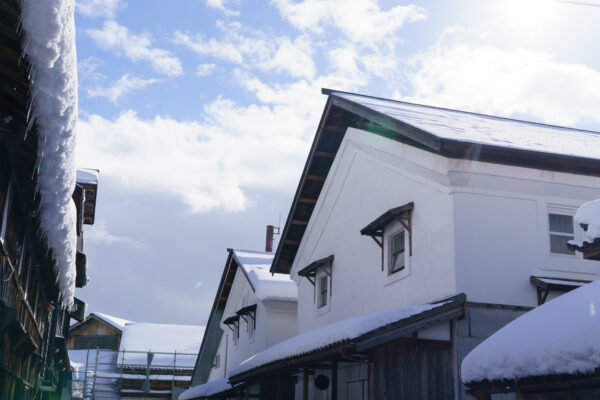
The Kinmasu Brewery is a 10-plus minute walk from Shinboda Station.
Founded in 1822. Sake is brewed using locally produced sake rice grown in-house and limpid water from the Iide mountain range.
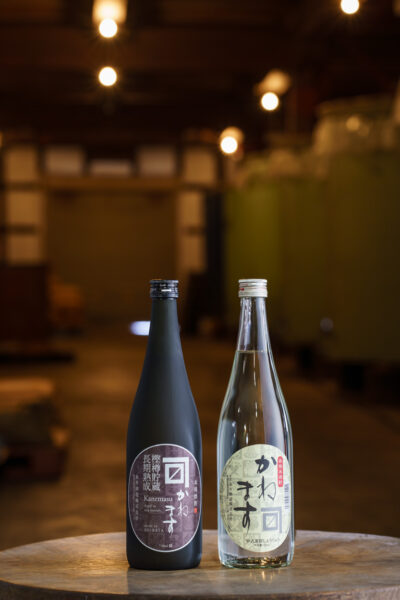 Along with sake, the company also focuses on rice shochu production using sake rice. There are two types of shochu: the rice shochu 'Kanare' and 'Kanare Kashi Barrel Stored', which is matured in oak barrels for a long time.
Along with sake, the company also focuses on rice shochu production using sake rice. There are two types of shochu: the rice shochu 'Kanare' and 'Kanare Kashi Barrel Stored', which is matured in oak barrels for a long time.

The sake is made from rice shochu, which the company also produces in-house. All sake is produced in-house.
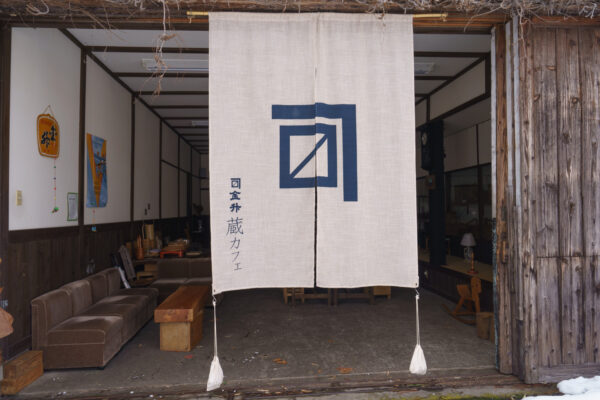
The museum is now closed to the public, but has beautiful gardens and a café that makes use of the historic buildings. We look forward to the day when it will be open to the public again.
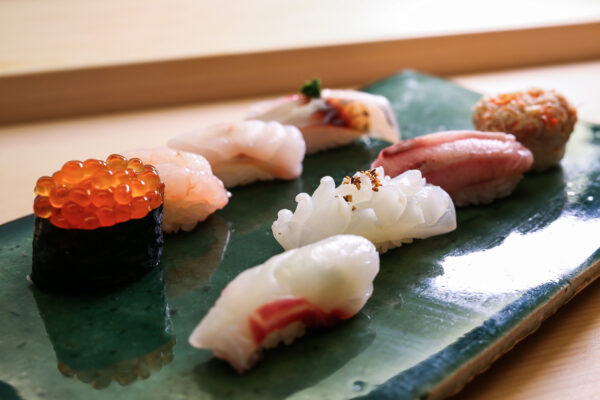
Sushi restaurants, izakayas (Japanese-style pubs) and eateries where local sake and local food can be enjoyed can be found in the city centre of Shinbata.
Sushi Tokiwa, which was once featured in a sushi feature in Niigata Hatsu R, is one of the best-loved local restaurants.
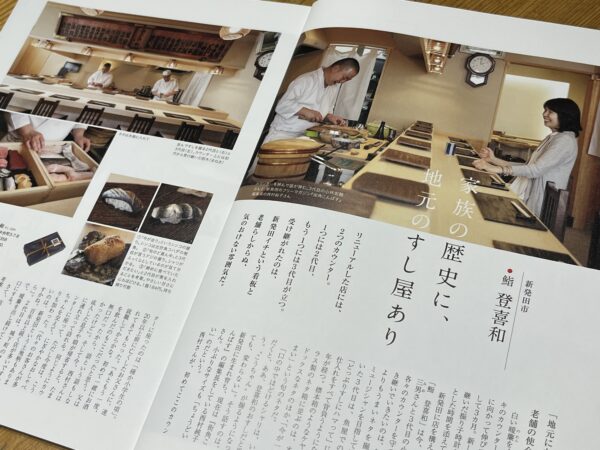 Niigata Hatsu R, 2017 Autumn/Winter, Issue 5: "Sushi restaurants in Niigata that I'll visit one day". I would like to enjoy local sake along with omakase nigiri and courses.
Niigata Hatsu R, 2017 Autumn/Winter, Issue 5: "Sushi restaurants in Niigata that I'll visit one day". I would like to enjoy local sake along with omakase nigiri and courses.
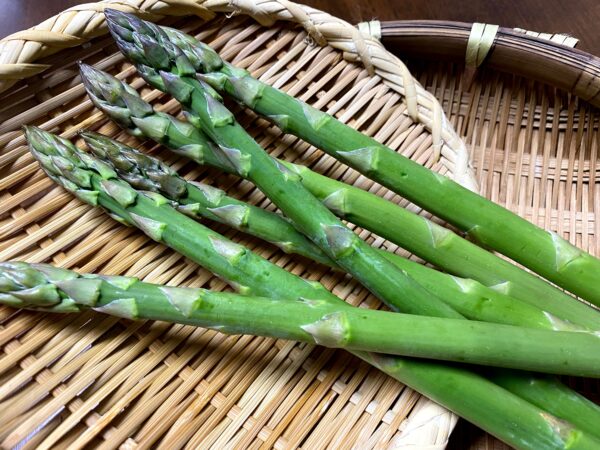
Asparagus is one of the most famous products of Shimbata! Thick, sweet and tender, it is a speciality product with the highest shipment volume in the prefecture.
From 1-31 May 2022, the ' Shoku no Asparagus Yokocho Aji Meguri with Shibata Beef' will be held at about 50 shops in the city, where visitors can enjoy dishes and sweets made from asparagus. The event is held in the production area to experience the fresh taste and the deliciousness of Shibata beef raised on rice straw produced in Shibata.
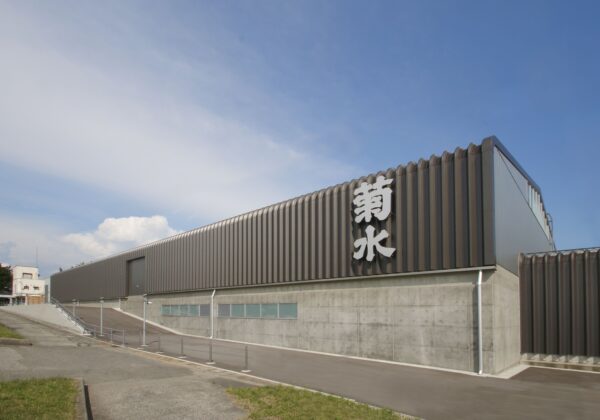
The Kikusui Brewery, known throughout Japan for its Funaguchi Kikusui Ichiban Shibori, is a 10-minute drive from Shimbata Station. It is located near the Kajigawa River on National Route 7. The Kajigawa River has long been a popular cherry blossom viewing spot.
Founded in 1881. The brewery is committed to brewing sake that makes the most of the North Echigo climate, which opens up to the north and south of the city of Niiwada.
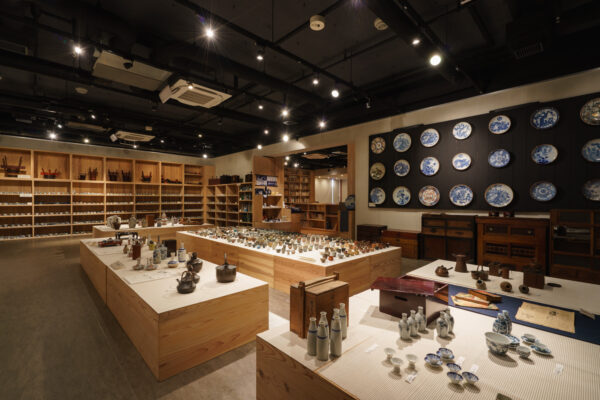
The Kikusui Institute of Japanese Sake Culture, with its valuable sake brewing tools and vessels for enjoying sake, library corner and sake cellar (Setsugoro warehouse), has been open to the public since 2018 (reservations required, along with garden tours).
In the shop on the premises, along with the company's own local sake, there is a selection of specialities from Kita-Echigo, as well as speciality products and sake containers selected by the brewery, which are exciting to look at.
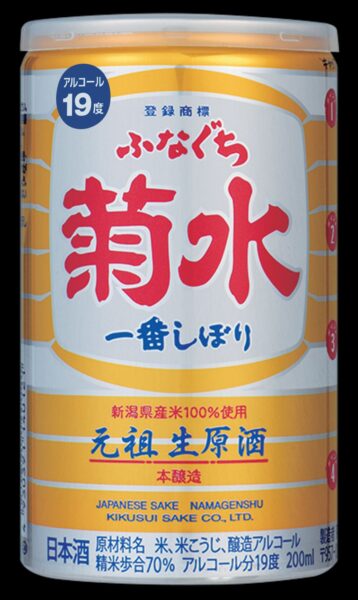 In autumn 2022, Funaguchi Kikusui Ichiban Shibori will celebrate 50 years since its birth. A points campaign is currently being run to celebrate the 50th anniversary (until 31 August 2022).
In autumn 2022, Funaguchi Kikusui Ichiban Shibori will celebrate 50 years since its birth. A points campaign is currently being run to celebrate the 50th anniversary (until 31 August 2022).
The story behind the development of this popular product, which has sold a total of more than 300 million bottles, was previously featured in Niigata Hatsu R.
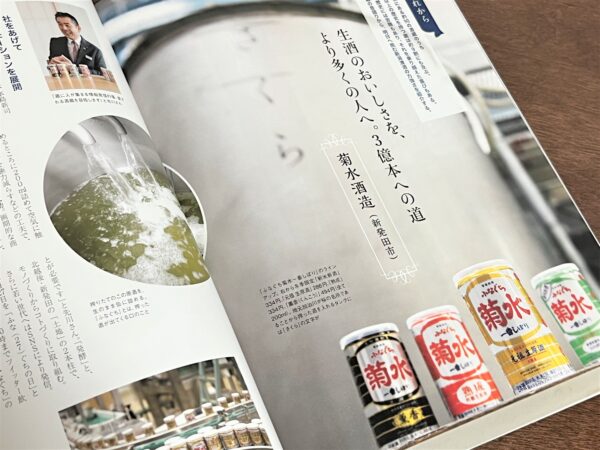
Niigata Hatsu R, Spring 2019, Issue 9: "Niigata SAKE Revolution". We want you to taste the story of the birth of a long-selling product and how it became a hit, along with the sake.
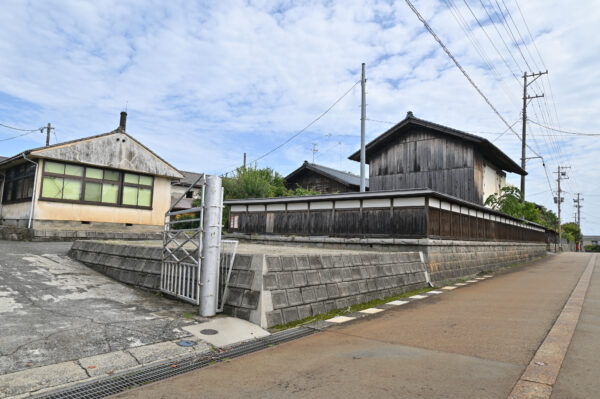 Lastly, the Fujinoi Sake Brewery is located just behind the brewery on Fujitsuka Beach, where there is a swimming beach.
Lastly, the Fujinoi Sake Brewery is located just behind the brewery on Fujitsuka Beach, where there is a swimming beach.
The company was founded in 1886.
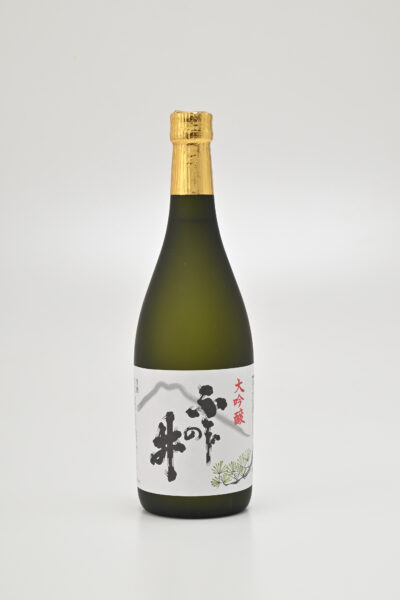 It is said that the brand name 'Fuji-no-i' was born from the fact that sake brewed in the 'Fuji-no-i well', which has been handed down in the area for centuries, has a vigorous fermentation process and tastes good.
It is said that the brand name 'Fuji-no-i' was born from the fact that sake brewed in the 'Fuji-no-i well', which has been handed down in the area for centuries, has a vigorous fermentation process and tastes good.
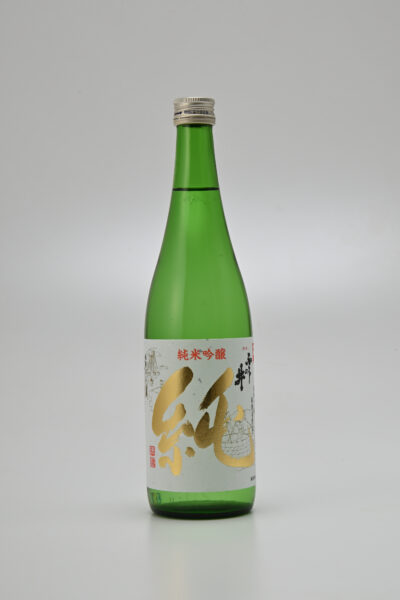 Fujinoi Junmai Ginjo Jun is one of the brewery's flagship bottles. It is characterised by a mellow texture and a delicious flavour that spreads in the mouth.
Fujinoi Junmai Ginjo Jun is one of the brewery's flagship bottles. It is characterised by a mellow texture and a delicious flavour that spreads in the mouth.
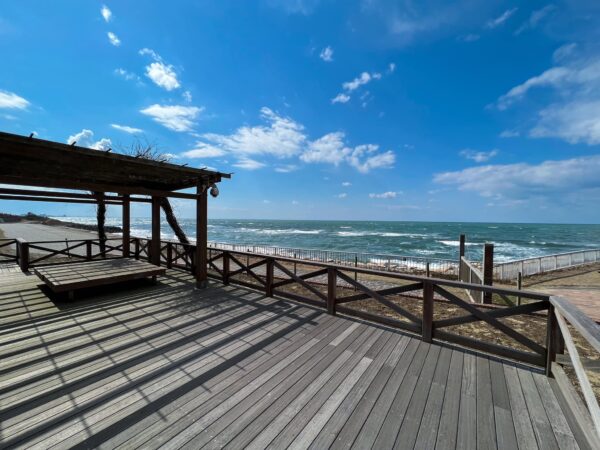
Near the brewery is Niigata Prefectural Shiyunji Memorial Park, where barbecue facilities have become very popular in recent years. Many people also enjoy bird-watching in Sazuri no Sato.
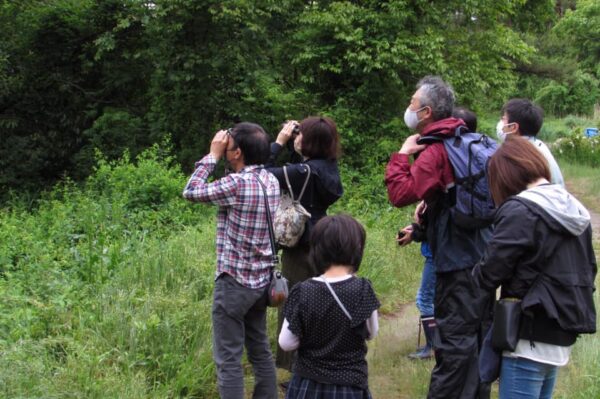
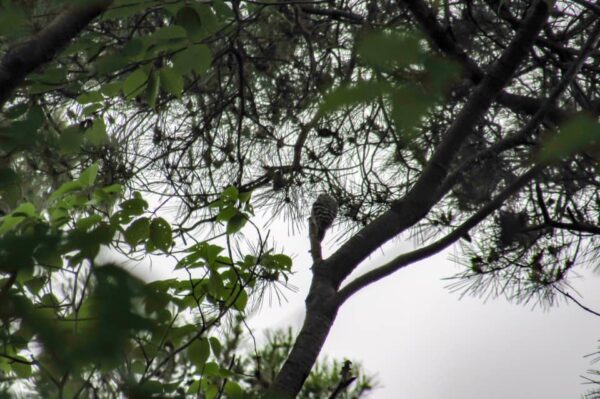
Furthermore, next to Fujitsuka Beach is Matsutsuka Fishing Harbour, the only fishing harbour in the new city.
The Fresh Fish Market, a processing and direct sales outlet, also sells processed seafood products processed by the fishermen themselves; it is open on Saturdays and Sundays from April to October, so drop in.
Six local brews, loved in two castle towns, carry smiles on the faces of the locals.
Go on a sake journey to enjoy the stories of six breweries that are nestled in the history and climate of the region.
Photo cooperation / Tomoko Takahashi, Hisao Watanabe, Niigata Prefecture Tourism Association, Niigata Prefecture Shiyunji Memorial Park, Taiyo Shuzo, Miyao Shuzo, Omon Shuzo, Kinmasu Shuzo, Kikusui Shuzo.
高橋真理子
2022.05.02
advertisement


